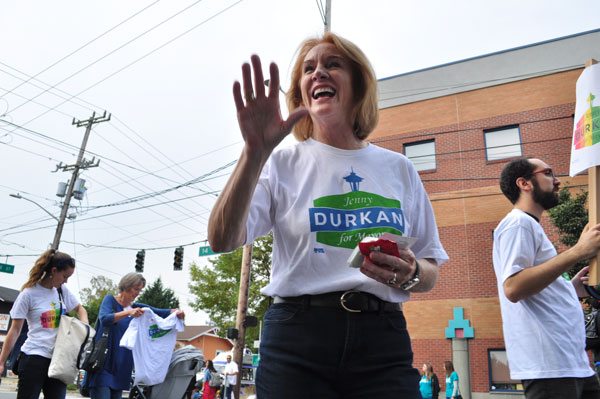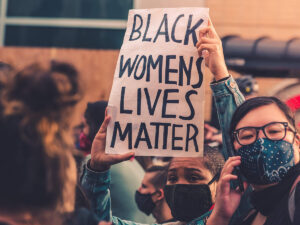
More women are on track to become mayors in the US cities than ever before. It may be, however, that their gender is incidental and what people really want is a different type of political leadership. Sarah Holder and Alastair Boone write for CityLab, “In all, when the remaining elections have been completed, there will have been at least a 25 percent jump in female mayors in the top 100 cities since last year. Since 2011, this jump is 177 percent.”
A recent report by the Barbara Lee Foundation, which has a focus on women in politics, notes, “Today, women running for office are motivated by a renewed sense of urgency, as well as optimism about their ability to compete at a moment when voters are thirsting for new ideas and fresh perspectives.”
The first woman ever elected as mayor in the US was Bertha Knight Landes in Seattle in 1926. This week, Seattle elected its first woman mayor since Landes, Jenny Durkan, who is also its first openly lesbian mayor. Holder and Boone continue,
Manchester ousted a male incumbent to elect Joyce Craig, the first female mayor in the city’s 266-year history…Provo elected the first woman to ever even file to run for mayor, Michelle Kaufusi. Framingham, Massachusetts, which just voted to become a city in April, elected Yvonne Spicer as its first ever mayor—and she’s a black woman. In April, St. Louis elected Lyda Krewson as its first female mayor; earlier this month, Canada’s Montreal made its own history, electing Valerie Plante; and on November 18, New Orleans will elect either LaToya Cantrell or Desiree Charbonnet as its first, as well.
Six other cities who already had their firsts achieved hard-won second and third women mayors. Since Rutgers began tracking these statistics in 1989, the highest proportion of women mayors in cities with a population of 30,000 and (including the top 100), was 21 percent.
In Topeka, Kansas, Michelle De La Isla, who was born in New York and raised in Puerto Rico, was elected mayor. She told the New York Times, “It’s easier to serve people when you’re not judging them from the get-go.”
Jean Sinzdak, Associate Director of the Center for Women and Politics at Rutgers University, says, “While the overall media narrative is focused on the fact that Democrats as a party did exceedingly well last night, the thread in that narrative that jumps out as me is that women and people of color drive that success.”
Holder and Boone note that each of these cities is seeking new leadership for its unique set of challenges. Further, in some cities voters are choosing from a slate of women, as in Seattle, Provo, and New Orleans. In Seattle, voters are looking for solutions to the affordable housing crisis; in Provo, it’s smart growth; in New Orleans, housing and criminal justice reform.
Erin Loos Cultraro, founder and CEO of She Should Run, which supports women candidates, says, “In research as far back as I’ve seen, often women say they want to run for office to get something done, and men want to gain power.”
But these women are also facing barriers. Besides what some describe as a chilly climate—a preponderance of men, derogatory terms, and sexual harassment—one experience that many women share is the expectation that they will justify their credentials.
Sign up for our free newsletters
Subscribe to NPQ's newsletters to have our top stories delivered directly to your inbox.
By signing up, you agree to our privacy policy and terms of use, and to receive messages from NPQ and our partners.
Odell Miner, said, before he came in third in Provo’s mayoral race,
The mayor is the chief executive officer of the community. You’re not looking for someone quote unquote “just off the streets” to step in and manage that type of responsibility…There are very qualified women in Provo who could serve as mayors, it just happens to be that neither of these ladies has traveled the miles or walked the footsteps so to speak to really be qualified.
The idea that the head of a governing body is akin to a CEO already sets the frame for a type of male leadership (and reinforces some other problematic assumptions about the goals of governance). This played out in the Seattle mayoral race.
While the Seattle Times endorsed Durkan for her traditional management experience, her opponent, Cary Moon, faced harsh criticism for the opposite. “For her accomplishments, she ticks off a list heavy on intangibles,” one Seattle Times reads. “Moon has struggled to show she has the management experience or concrete accomplishments to prepare her to lead a $5.3 billion, 12,000-employee city bureaucracy.”
Yet, Moon, like many others, reported deciding to run for office after the election of Trump last November to “show a different kind of leadership.”
The aforementioned Barbara Lee Foundation report highlights that
research illustrates that demonstrating both likeability and qualifications is important for women candidates. We’ve repeatedly found women face a litmus test men do not: Voters will support a male candidate they do not like but who they think is qualified, but don’t apply the same standard to women. Women also have to do more to prove they are qualified. For men, their qualification is assumed.
[…]
When it comes to establishing qualifications and demonstrating likeability, it is better for women candidates, regardless of party, to highlight specific accomplishments rather than simply describe their background or status as an outsider.
—Cyndi Suarez













